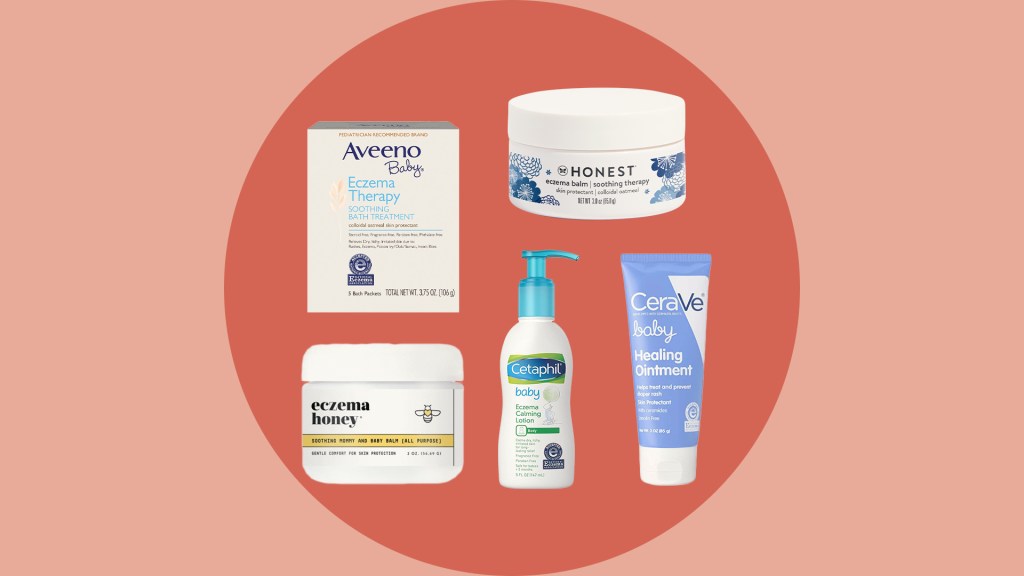If you purchase an independently reviewed product or service through a link on our website, SheKnows may receive an affiliate commission.
Eczema is itchy and uncomfortable no matter what age you are, but it’s especially painful to watch babies and toddlers go through it, because they may not be able to communicate their discomfort. All you want to do is make them feel better, and using eczema products that soothe kids’ skin is a great way to start, but it’s also important to understand this skin condition and how your genetics may play a role — because they do. “Eczema is generally a hereditary condition,” Latanya T. Benjamin, MD, FAAD, Associate Professor of Pediatric Dermatology and Consulting Dermatologist for Mustela, tells SheKnows. “Eczema is 40 to 50 percent more likely to occur in children if one parent has a history of the condition. This increases to 50 to 80 percent if both parents suffer with eczema.”
Eczema can affect both kids and adults. “Although it’s possible to develop adult-onset eczema, most adults who have eczema have had it since childhood,” Hadley King, MD, Clinical Instructor of Dermatology at the Weill Medical College of Cornell University and Consulting Dermatologist for AcneFree, tells SheKnows. “For most kids, eczema improves with age but this is not true for everyone.”
Kids and Eczema: What to Know
As a reminder, eczema causes dry, rough, itchy, sometimes reddish patches of skin. It can be irritated by allergens, heat, and sweating, so symptoms tend to flare up in the spring and summer months, but winter can also be a tough season. “About half of my pediatric patients have worse eczema in the wintertime (due to excessive dryness of the skin and lack of atmospheric humidity) and the other half in the summer (due to heat that triggers intense itching),” Dr. Benjamin says. “Unfortunately, patients with the worst cases of eczema can be impacted year-round.” In babies, the scalp, neck folds, and face might be problem areas; for older kids, the ankles, wrists, between the fingers, the inner elbow, or behind the knee can be spots for patches to form, says pediatrician Dr. Mona Amin.
Though eczema is mostly hereditary, there are other things that can trigger it, namely stress in a child’s life — which “never helps any skin condition, whether it be acne, psoriasis or eczema,” Dr. Benjamin says. Aside from keeping your kid calm, there are other things parents can do to help their children’s eczema stay under control. For starters: Learn to identify — and avoid — your child’s specific triggers that result in an eczema flare, Benjamin says. Also, anyone with eczema should avoid excessive drying of the skin — so say goodbye to long hot baths or showers and stick to bathing in cooler water. Avoid harsh detergents and soaps (try all-natural cleaning products instead), products with fragrances, and any known allergic foods.
Choosing an Eczema Treatment for Kids
Tending to the skin barrier is the key to managing eczema, Dr. King says. “This means diligent use of hydrators and emollients and cleansing only with very gentle soap substitutes that won’t strip the skin of its natural oils and dry out the skin like detergents can. Humidifiers can also be helpful. When necessary, there are prescription medications that can be used to manage eczema, including topical and systemic corticosteroids and other immunomodulators.”
The products you use make a big difference as well — and making sure to apply them as soon as you see rough patches or notice your child getting itchy. “Moisturization and a good ointment can really help reduce the frequency of flares,” Dr. Amin says. “Gentle skin care and generous use of ointments or moisturizers can contain the eczema.” As experts previously told SheKnows, you want to look for fragrance-free products that contain gentle, moisturizing ingredients like colloidal oatmeal, ceramides, glycerin, hyaluronic acid, and shea butter, while avoiding treatments that contain fragrances, dyes, or tons of chemicals.
Eczema is a chronic condition that comes and goes, so parents shouldn’t blame themselves when a flare-up happens. Just stick to your child’s skincare routine and it will get better. “Consistency and maintenance are key for eczema-prone skin,” Dr. Benjamin says. So consider adding the following eczema treatments for kids, which are specifically designed to soothe skin the skin of babies, toddlers, and young children, to your little one’s routine.
A version of this story was published October 2019.
-
Flexitol Happy Little Bodies Eczema Relief Cream

Image Credit: Flexitol Flexitol’s eczema relief cream actually outperformed hydrocortisone in relieving itch, redness, and swelling in a clinical study, according to the brand — and it comes without the steriod side effects. Gentle and formulated with natural ingredients, this cream is designed to moisturize your little one’s skin while relieving redness and that horrible itch.
Flexitol Happy Little Bodies Eczema Relief Cream$14.99
on Amazon.com
-
Aveeno Baby Eczema Therapy Nighttime Balm

Image Credit: Aveeno Dr. Amin recommends all the Aveeno baby products and says the nighttime balm is especially good. “The fact that it’s a balm really helps to keep in that moisture a little bit better versus a lotion, because balms tend to be more greasy,” she explains. “It’s not greasy where it leaves it on your hands as the adult putting it on. It just keeps the moisture in longer for that child, and it can be really helpful.”
It’s available to shop at Amazon, Target, and Walmart.
Aveeno Baby Eczema Therapy Nighttime Balm$18.66 $26.74 30% Off
on Amazon.com
-
Eucerin Baby Eczema Relief Cream

Image Credit: Eucerin Your mom probably used Eucerin on your dry, itchy skin as a baby, and her mother before that. The colloidal oatmeal formula nourishes skin, and the ceramides help keep moisture levels in the skin barrier high.
Eucerin Baby Eczema Relief Cream$9
-
Baby Dove Hypoallergenic Wash

Image Credit: Target When bath time rolls around, you want your baby to have that sweet, clean smell without any artificial ingredients or chemicals that’ll further irritate already irritated skin. Baby Dove wash has no fragrance chemicals and turns into a rich lather that you can safely use on the baby’s face or body skin.
Baby Dove Hypoallergenic Wash$10
-
Munchkin Eczema Spray

Image Credit: Target Give your eczema-prone child a cooling, cleansing spritz of relief from the itching. The antibacterial spray cuts back on the germs that tend to cause an eczema flareup, and is easy to throw in a diaper bag or beach bag for the day.
-
TruKid Eczema Sunscreen SPF 30+

Image Credit: Target Eczema-prome skin still needs sun protection! This mineral-based natural sunscreen is made to moisturize skin while providing important sun protection for kids.
It’s available to shop at Target and Amazon.
-
Aveeno Baby Eczema Therapy Soothing Bath Treatment

Image Credit: Aveeno Harsh soaps can strip your baby’s skin, leaving it even more parched, but this gentle bath treatment will keep your little one’s skin hydrated and boost the skin’s moisture barrier. It contains colloidal oatmeal to soothe itching, so it also offers plenty of relief to bug bites and rashes.
It’s available to shop at Target and Amazon.
Eczema Therapy Soothing Bath Treatment$6.50
-
Cetaphil Baby Eczema Soothing Lotion

Image Credit: Cetaphil Remember what we said earlier about boosting your baby’s moisture barrier? This will do the trick. Slather it on daily to hydrate even the most sensitive skin and soothe itching.
It’s available to shop at Target, Amazon, and Walmart.
Cetaphil Baby Eczema Soothing Lotion$10
-
Up & Up Anti-Itch 1% Hydrocortisone Intensive Healing Cream

Take care of that pesky itch with hydrocortisone 1% cream from Target. This $7 healing formula offers fast relief that calms and hydrates sensitive skin. And thanks to its maximum strength, it lasts up to 10 hours!
Anti-Itch 1% Hydrocortisone Intensive Healing Cream$6.89
-
Tubby Todd All Over Ointment

Give your little one a moisturizing balm that does everything. Tubby Todd’s All Over Ointment instantly soothes eczema, dry skin, redness, and other irritation. Bonus: this plant-powered formula is FDA-approved!
-
Granberg Bamboo Eczema Gloves for Kids

Image Credit: Amazon. Got an itchy kid? Deter scratching and lock in moisture from creams and ointments by having your child wear gloves to bed or around the house. These are made of breathable bamboo, are machine washable and are made in various sizes to fit little hands.
Granberg Bamboo Eczema Gloves$25
-
Honest Company Eczema Soothing Therapy Balm

Image Credit: Honest Company Apply this gentle balm to eczema patches to soothe irritation and rough skin. The formula is free of steroids and is a combination of prebiotics and natural ingredients, including colloidal oatmeal, coconut and safflower oils.
It’s available to shop at Honest Company, Amazon, and Walmart.
Eczema Soothing Therapy Balm$14.28
on Amazon.com
-
California Baby Therapeutic Relief Eczema Shampoo & Bodywash

Image Credit: California Baby The main ingredient here is oatmeal, which is a natural skin soother. Protecting baby’s skin starts at bath time, so use this twofer for shampoo and body wash. The balanced formula heals cracks and irritations.
It’s available to shop at California Baby, Amazon, and Walmart.
California Baby Shampoo Bodywash$47.50
on Amazon.com
-
CeraVe Baby Healing Ointment

Image Credit: Amazon. Made to treat diaper rash, this ointment protects skin and is healing for eczema flares.
It’s available to shop at Amazon and Walmart.
CeraVe Diaper Rash Cream$10.99 $10.99
on Amazon.com
-
Exederm Hydrating Baby Lotion

Image Credit: Amazon. This gentle moisturizer is ranked with five stars by the National Eczema Association — and for good reason. Not only is it made to lock in moisture but it’s free of additives likely to irritate sensitive skin.
Exederm Hydrating Baby Lotion$13.30+
-
Eczema Honey Soothing Mommy and Baby Balm

Image Credit: Eczema Honey. In this luxe balm, candelilla wax, mango butter and essential oils combine to moisturize and protect skin. Colloidal oatmeal soothes. Be sure to do a patch test first to rule out an allergy to any of the ingredients.
Eczema Honey Skin-Soothing Cream$22.46
-
TruKid Eczema Bubble Podz

Image Credit: Amazon. Pre-measured pods make it easy to give a kid a bubble bath — and these are specially designed with natural skin-soothing ingredients for kids with eczema.
It’s available to shop at Target and Amazon.
TruKid Soothing Skin Bubble Podz$23.99
on Amazon.com
-
Aquaphor Baby Healing Ointment

Image Credit: Aquaphor This multitasker is made for babies’ sensitive skin, and it delivers relief to eczema by hydrating and protecting the skin. Panthenol and glycerin bring deep moisture and protect the skin. The multitasker also works on chapped cheeks, bug bites and cuts.
It’s available to shop at Target, Amazon, and Walmart.
Aquaphor Baby Healing Ointment$15.97, originally $17.29
-
Wrap-E-Soothe Eczema Sleeves for Kids

Image Credit: Amazon. If your kid flares up around the knees and elbows, these sleeves will help relieve itching and are perfect to wear over moisturizer at night.
Wrap-E-Soothe Eczema Sleeves for Kids$37.99 $29.95
on Amazon.com
-
Gladskin Eczema Cream

Image Credit: Gladskin. This eczema treatment from Gladskin only uses a few simple ingredients that are safe and effective for babies and young children. The oatmeal-free, soothing cream can be used on the face and body to restore the skin to its natural, healthy state thanks to its patented Micreobalance® ingredient. And better yet, any eczema itch, redness, or discomfort is noticeably reduced i only three days with this cleanly formulated moisturizer.
Eczema Cream for Babies and Kids$35+
-
Mustela Stelatopia Skin Soothing Pajamas

Image Credit: Mustela You and your baby will sleep better when your little one is tucked into these PJs that are made specifically for eczema-prone skin. Made from 100% cotton, they use microcapsule technology to provide moisture to soothe the skin all night long. They run from baby to toddler sizes.
Mustela Stelatopia Skin Soothing Pajamas$39.49
-
Elizabeth Parker Baby Eczema Cream

Image Credit: Elizabeth Parker If you prefer that your baby’s skin care products come from nature, this is the cream for you. The natural, organic cream can be used on the face and body to deliver relief instantly and over time — it works its magic for up to eight hours. You can also use it to treat diaper rash and bug bites.
Elizabeth Parker Baby Eczema Cream$17.49
on Amazon.com





